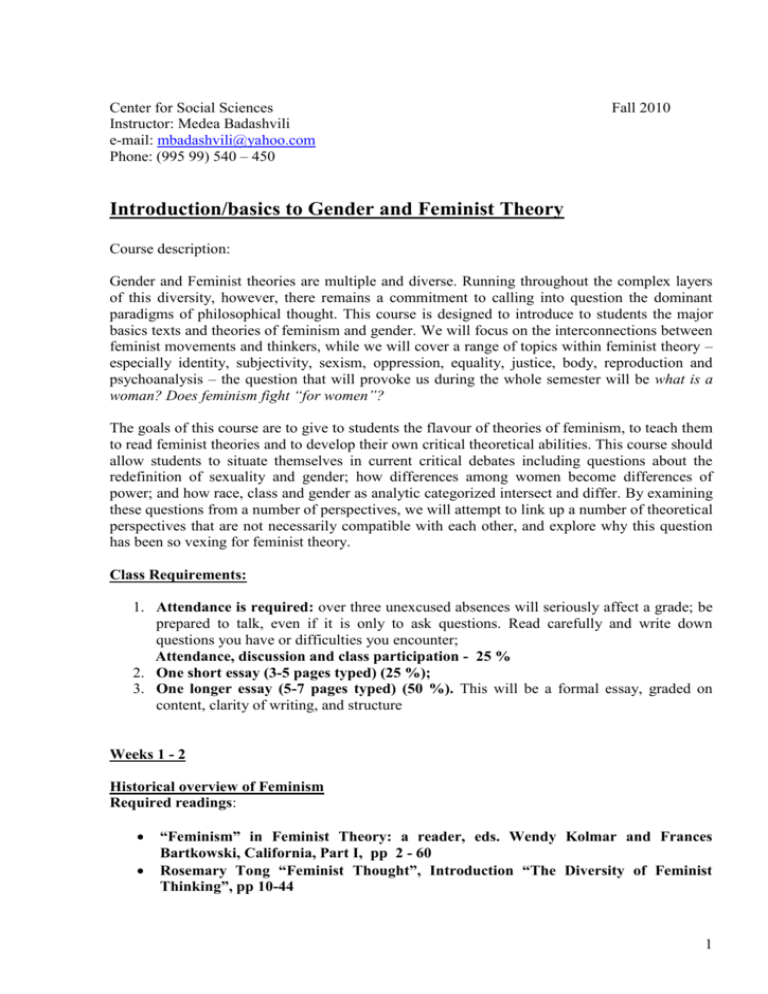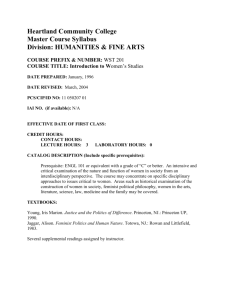
Center for Social Sciences
Instructor: Medea Badashvili
e-mail: mbadashvili@yahoo.com
Phone: (995 99) 540 – 450
Fall 2010
Introduction/basics to Gender and Feminist Theory
Course description:
Gender and Feminist theories are multiple and diverse. Running throughout the complex layers
of this diversity, however, there remains a commitment to calling into question the dominant
paradigms of philosophical thought. This course is designed to introduce to students the major
basics texts and theories of feminism and gender. We will focus on the interconnections between
feminist movements and thinkers, while we will cover a range of topics within feminist theory –
especially identity, subjectivity, sexism, oppression, equality, justice, body, reproduction and
psychoanalysis – the question that will provoke us during the whole semester will be what is a
woman? Does feminism fight “for women”?
The goals of this course are to give to students the flavour of theories of feminism, to teach them
to read feminist theories and to develop their own critical theoretical abilities. This course should
allow students to situate themselves in current critical debates including questions about the
redefinition of sexuality and gender; how differences among women become differences of
power; and how race, class and gender as analytic categorized intersect and differ. By examining
these questions from a number of perspectives, we will attempt to link up a number of theoretical
perspectives that are not necessarily compatible with each other, and explore why this question
has been so vexing for feminist theory.
Class Requirements:
1. Attendance is required: over three unexcused absences will seriously affect a grade; be
prepared to talk, even if it is only to ask questions. Read carefully and write down
questions you have or difficulties you encounter;
Attendance, discussion and class participation - 25 %
2. One short essay (3-5 pages typed) (25 %);
3. One longer essay (5-7 pages typed) (50 %). This will be a formal essay, graded on
content, clarity of writing, and structure
Weeks 1 - 2
Historical overview of Feminism
Required readings:
“Feminism” in Feminist Theory: a reader, eds. Wendy Kolmar and Frances
Bartkowski, California, Part I, pp 2 - 60
Rosemary Tong “Feminist Thought”, Introduction “The Diversity of Feminist
Thinking”, pp 10-44
1
Betty Friedan “The problem than has no name” , (“The Feminist Theory”, Part IV,
pp 198 – 203)
Showing the film – “Who will sing a lullaby…..”, presented by Ukrainian Women’s
Fund
Recommended readings:
Mary Wollstonecraft, “A Vindication of the Rights of Woman”
Week 3
Categorizing Differences/Making Categories
Required readings:
Uma Narayan “Essence of Culture and a Sense of History: A Feminist Critique of
Cultural Essentialism”, (“Women, Culture and Society”, pp. 79-94)
Wendy W. Williams “The Equality Crisis: Some Reflections on Culture, Courts,
and Feminism”, (“Feminist Social Thought: A reader”, pp. 696-713)
Weeks 4 – 6
Introduction to Sexism and Oppression
Required readings for week 4:
Sulamith Firestone, “The Dialectic of Sex” (Nicholson, pp. 19-26)
Gale Rubin, “The Traffic in Women” (Nicholson, pp. 27-62)
Required readings for weeks 5 - 6:
Ann Cudd and Leslie Jones, “Sexism” (Cudd and Andreasen, pp. 73-83)
Marilyn Frye, “Oppression” (Cudd and Andreasen, pp. 84-90)
Sandra Lee Bartky, “On Psychological Oppression” (Cudd and Andreasen, pp. 105114)
Iris Marion Young, “Five Faces of Oppression” (Cudd and Andreasen, pp. 91-104)
Required reading for week 6
Nancy Chodorow, “The Psychodynamics of the family” (Nancy Chodorow “The
Reproduction of Mothering; Psychoanalysis and the Sociology of Gender” pp. 191211) “Oedipal Asymmetries and heterosexual Knots”, “The Cycle Copleted:
Mothers and Children”, “Gender Personality and the Reproduction of Mothering”
Week 7
Identity and Subjectivity
Required readings:
2
Michelle M. Moody Adams “Self/other” (Alison M. Jaggar and Iris Marion Young
“A Companion to Feminist Philosophy” pp. 255-263)
Tina Chanter “Postmodern subjectivity” (Alison M. Jaggar and Iris Marion Young
“A Companion to Feminist Philosophy” pp. 263-272)
Rosi Braidotti “Sexual difference theory” (Alison M. Jaggar and Iris Marion Young
“A Companion to Feminist Philosophy” pp. 298-307)
The first paper due by the end of this week
Week 8- 9
Bodies and Representation
Required readings for week 8 - Woman as Body:
Elizabeth V. Spelman “Woman as Body: Ancient and Contemporary Views” (Janet
Price and Margrit Shildrick “Feminist Theory and the Body” pp. 32-41)
Lynda Birke “Bodies and Biology” (Janet Price and Margrit Shildrick “Feminist
Theory and the Body” pp. 42-49)
Helen Marshall “Our Bodies, Ourselves: Why We Should Add Old Fashioned
Empirical Phenomenology to the New Theories of the Body” (Janet Price and
Margrit Shildrick “Feminist Theory and the Body” pp. 64-75)
Required readings for week 9 – Sexy bodies:
Lucy Irigaray, “When Our Lips Speak Together” (Janet Price and Margrit
Shildrick “Feminist Theory and the Body” pp. 82-90)
Lynne Segal “Body Matters: Cultural Inscriptions” (Janet Price and Margrit
Shildrick “Feminist Theory and the Body” pp. 105-111)
Denise Riley “Bodies, Identities, Feminisms” (Janet Price and Margrit Shildrick
“Feminist Theory and the Body” pp. 220-227)
Recommended readings for weeks 8- 9:
Jennifer L. Morgan, “Some could suckle over their shoulder”: Male Travelers,
Female Bodies, and the Gendering of Racial Ideology” (Barbara Balliet, “Women,
Culture, and Society”, pp. 95-114);
John Berger, “The Ways of Seeing” (Barbara Balliet, “Women, Culture, and
Society”, pp. 114 – 121);
Weeks 10 - 11:
Performing the Body
Required readings:
3
Judith Butler “Bodily Inscriptions, Performative Subversions” ((Janet Price and
Margrit Shildrick “Feminist Theory and the Body” pp. 416-423)
Margrit Shildrick and Janet Price “Breaking the boundaries of the broken body”
pp 432-444
Elizabeth Grosz “Bodies - Cities” (Janet Price and Margrit Shildrick “Feminist
Theory and the Body” pp. 381-388)
Sandra Lee Bartky “Body Politics” (Alison M. Jaggar and Iris Marion Young “A
Companion to Feminist Philosophy” pp. 321-330)
Trinh T. Minh – ha “Write your body and the Body in theory”, pp 258-266
Elizabeth Grosz “Psychoanalysis and the Body”, pp 267 – 271
Moira Gatens “Power, Bodies and Difference”, pp 227 – 233
Susan Bordo “Feminism, Foucault and the Politics of the Body”, pp 246 - 255
Judith Butler “Bodies That Matter” pp. 27 - 55
Monique Wittig “One is Not Born a Woman” (Nicholson, pp. 265-271)
Week 12:
Women, Equality, and Justice
Required readings:
Christine A. Littleton “Reconstructing Sexual Equality” ((Feminist Social Thought,
pp. 714-735)
John W. Scott “Deconstructing Equality – Versus-Difference: Or, the Uses of
Poststructuralist Theory of Feminism” (Feminist Social Thought, pp. 757-771)
Showing the film – “Return”, presented by Open Society Georgia Foundation
Weeks 13-14
Solidarity and political engagement
Required readings:
Bell Hooks “Sisterhood: Political Solidarity between Women” (Feminist Social
Thought, pp. 484 – 500)
Chantal Mouffe “Feminism, Citizenship, and Radical Democratic Politics”
(Feminist Social Thought, pp. 532-547)
The last paper due by this week
Week 15
The revision of final papers and small presentations
Conclusion
4










